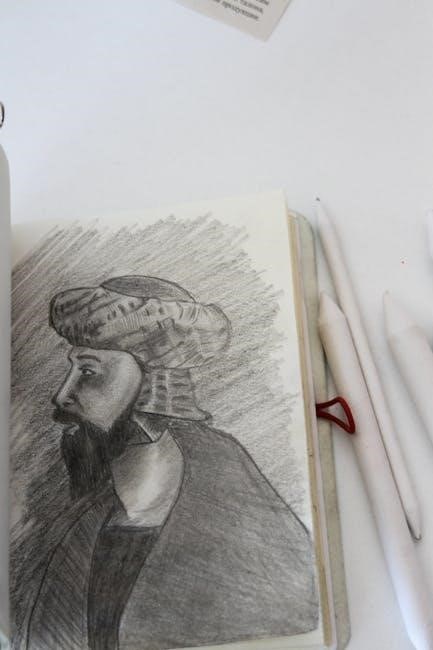The Talent Code by Daniel Coyle reveals how talent is cultivated through deep practice, ignition, and coaching, backed by brain science and real-world examples.
Overview of the Book and Its Author
The Talent Code, written by Daniel Coyle, is a groundbreaking book that explores the science behind talent development. Coyle, a renowned journalist and New York Times bestselling author, delves into the mechanics of skill acquisition, challenging the notion that talent is born. Through extensive research and visits to talent hotbeds worldwide, he identifies three key elements—deep practice, ignition, and master coaching—that drive exceptional performance. The book also introduces the concept of myelin, a neural substance that enhances skill development. Coyle’s insights are backed by cutting-edge neurology and real-world examples, offering a practical guide for anyone seeking to unlock their potential or nurture talent in others. This book is a must-read for educators, coaches, and anyone passionate about growth and excellence.
Key Themes and Concepts Explored
The Talent Code delves into the science of talent development, emphasizing the role of deep practice, ignition, and master coaching. These elements work together to build myelin, a neural substance that enhances speed and accuracy in skills. Coyle also explores the “sweet spot” of learning, where challenges are balanced with rewards, and the importance of primal cues in igniting passion. The book challenges the idea that talent is innate, instead highlighting the power of deliberate effort and strategic practice. By examining talent hotbeds across various fields, Coyle provides actionable insights for cultivating excellence in sports, music, education, and beyond, making it a transformative read for anyone seeking to maximize potential.

Deep Practice: The Foundation of Skill Development

Deep practice involves focused, repetitive effort to improve specific skills, targeting weaknesses and using feedback to refine performance, accelerating learning and mastery significantly.
Understanding the “Sweet Spot” of Learning
The “Sweet Spot” of learning is the optimal balance between challenge and skill level, where growth occurs most effectively. It’s the zone where tasks are neither too easy nor too difficult, engaging the learner fully. Coyle explains that this spot triggers deep practice, fostering focus and repetition. By targeting specific weaknesses and using immediate feedback, learners refine their skills efficiently. This process strengthens myelin, the neural substance that enhances speed and accuracy in tasks. The Sweet Spot is crucial for accelerating skill development, as it ensures efforts are both challenging and productive, leading to mastery over time.
How Deep Practice Accelerates Skill Acquisition
Deep practice, a focused and deliberate form of practice, accelerates skill acquisition by targeting specific weaknesses. It involves breaking skills into smaller parts, repeating them, and refining through immediate feedback. This method builds myelin, a neural insulator that enhances signal speed and accuracy. Coyle highlights that deep practice can increase learning speed up to ten times faster than conventional methods. By concentrating on the “Sweet Spot” of challenge, learners engage in meaningful repetition, solidifying neural pathways. This approach is exemplified in talent hotbeds, where intense, targeted practice cultivates exceptional abilities. Deep practice transforms effort into mastery, proving that skill development is not innate but cultivated through dedicated, structured effort.

Ignition: The Role of Motivation and Passion
Ignition sparks passion through primal cues, driving commitment and fueling the pursuit of excellence. It transforms motivation into a sustained journey toward mastery, essential for talent development.
Triggering Passion Through Primal Cues
Primal cues, such as seeing excellence in action or experiencing a spark of inspiration, ignite passion. These cues tap into deep, unconscious desires, creating a strong emotional connection to a skill or activity. Coyle explains that when individuals encounter these cues, they are more likely to commit to the long-term effort required for mastery. For example, a young musician hearing a virtuoso performance might feel an overwhelming desire to emulate that level of artistry. By understanding and leveraging these cues, educators and coaches can inspire others to pursue their passions with intensity and purpose, laying the foundation for sustained talent development.

Commitment and the Journey to Mastery
Commitment is the backbone of talent development, transforming initial passion into sustained effort. Coyle emphasizes that mastery requires more than fleeting motivation; it demands consistent, long-term dedication. This commitment is often fueled by a supportive environment and the guidance of master coaches who help individuals stay focused and resilient. The journey to mastery is marked by relentless practice, embracing challenges, and perseverance through setbacks. By cultivating this unwavering commitment, individuals can harness their potential, build myelin, and achieve extraordinary skill levels in their chosen domain, whether in sports, music, or other fields.

Master Coaching: The Art of Teaching
Master Coaching involves guiding individuals to unlock their potential through tailored strategies, fostering deep practice, and igniting passion, creating an environment where talent flourishes.
The Four Virtues of Effective Coaches
Effective coaches possess four key virtues: awareness, empathy, creativity, and simplicity. Awareness allows them to observe and understand their students’ needs. Empathy builds trust, fostering a supportive environment. Creativity enables coaches to craft tailored strategies, while simplicity ensures clarity in communication. These virtues guide coaches to inspire deep practice, ignite passion, and nurture growth. By balancing these traits, they unlock potential and drive mastery, making them indispensable in talent development. Coyle highlights these qualities through real-world examples, showing how they transform ordinary teaching into extraordinary coaching, ultimately helping individuals reach their highest potential.
Strategies for Bringing Out the Best in Students
Effective coaches use targeted strategies to unlock student potential. These include setting clear, achievable goals, providing focused feedback, and encouraging self-reflection. By creating a supportive environment, coaches foster resilience and passion. They also leverage the power of observation, helping students identify and correct weaknesses. Techniques like micro-drills and deliberate practice are employed to build skill mastery. Coaches further inspire by sharing success stories and primal cues that ignite motivation. Ultimately, these strategies align with the brain’s ability to grow myelin, ensuring faster and more accurate skill execution. Coyle emphasizes that these methods, when applied consistently, can transform ordinary learners into extraordinary achievers.

The Science of Myelin and Talent Development
Myelin, a neural substance, accelerates skill development by enhancing speed and accuracy. It grows through deep practice, transforming effort into mastery and enabling extraordinary performance.
Neurological Mechanisms Behind Skill Growth

The growth of myelin, a protective neural substance, is central to skill development. As we practice, myelin wraps around neural pathways, speeding up communication and enhancing precision. This process, driven by deep practice, repetition, and focused effort, strengthens connections between brain cells. Over time, myelinated pathways enable faster and more accurate performance, forming the biological foundation for mastery. Coyle highlights that myelin is not fixed at birth but can be cultivated, making skill growth accessible to anyone willing to invest time and effort into deliberate practice.
How Myelin Enhances Performance and Accuracy
Myelin acts as a neural insulator, accelerating the transmission of electrical impulses in the brain; Thicker myelin layers ensure faster and more precise communication between neurons, which directly enhances performance and accuracy. This biological improvement allows individuals to execute skills with less effort and higher consistency. Over time, myelinated pathways become automatic, freeing the mind to focus on innovation and improvement. Coyle emphasizes that this process is not innate but developed through targeted practice, making it attainable for anyone committed to mastery.

Real-World Applications of The Talent Code
The Talent Code transforms talent development across sports, music, education, and more, offering practical tools to maximize potential and achieve excellence in any field through proven strategies.
Success Stories from Sports, Music, and More
Daniel Coyle shares inspiring success stories, such as musicians mastering instruments through deep practice and athletes excelling in sports by leveraging myelin growth. These examples highlight how talent is cultivated, not born, and demonstrate the effectiveness of the three key elements: deep practice, ignition, and master coaching. By focusing on deliberate effort and strategic learning, individuals across various fields achieve remarkable success, proving that greatness is grown through dedication and the right approach. These real-world applications of The Talent Code illustrate the transformative power of targeted practice and passion-driven development.
Implementing the Concepts in Education and Training
Implementing The Talent Code in education and training involves integrating deep practice, ignition, and master coaching. Educators can foster focused learning by designing engaging exercises that challenge students. Motivation is key; igniting passion through real-world examples and personalized learning can enhance commitment. Master coaching principles, such as clarity and positivity, guide teachers to provide effective support. Understanding myelin’s role in skill development encourages practices that build neural connections, leading to faster learning. Professional development and innovative tools can aid educators in applying these strategies, while assessments should focus on skill application. Collaboration with parents and stakeholders ensures a supportive environment for students to excel. This approach transforms education by cultivating talent through deliberate effort and passion-driven development.
